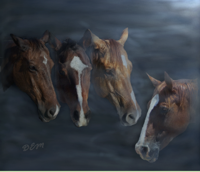
Resistence
[As additional resources, links to book reviews and book purchasing information can be found beneath the quotations when this information is available.]
"The lesson should never be interrupted, and it should on no account be terminated by reason of the resistance of the horse."
James Fillis, Breaking and Riding
Buy Book
(Top)
"A horse's breaking is not definitely completed if he has made no show of resistance, because there may be struggles for supremacy in the future. The object of breaking is the destruction of the free will of the horse. As long as a breaker hesitates to provoke struggles which he feels are close at hand, and which he knows are inevitable, his breaking is not complete."
James Fillis, Breaking and Riding
Buy Book
(Top)
"When a horse makes a defence always on the same side, we may be sure that he does so on account of pain or of faulty conformation."
James Fillis, Breaking and Riding
Buy Book
(Top)
"The true talent of the breaker consists in making himself master of the horse, especially in the event of a fight, by suppling him, and by the employment of a rational method of breaking; because we must not forget that the horse always struggles against the rider, more or less openly, until his education is complete."
James Fillis, Breaking and Riding
Buy Book
(Top)
"With force in there, why he won't learn what you're hoping he will, but he'd be learning a lot about resisting a person."
Bill Dorrance and Leslie Desmond, True Horsemanship Through Feel
Read Review
Buy Book
(Top)
"There is always a rightful place for a horse to exercise his concern for self-preservation. It's important to remember that this is the horse's right."
Bill Dorrance and Leslie Desmond, True Horsemanship Through Feel
Read Review
Buy Book
(Top)
"No better than some people present their ideas to a horse, they just bring out resistance in him. From there, a person may feel the need to continue presenting some things to that horse in a forceful and demanding way."
Bill Dorrance and Leslie Desmond, True Horsemanship Through Feel
Read Review
Buy Book
(Top)
"At any point in your practicing, if a horse starts to hold his breath, or get all rigid through his body, you'd want to hold off."
Bill Dorrance and Leslie Desmond, True Horsemanship Through Feel
Read Review
Buy Book
(Top)
"There's bound to be problems coming up for some people when they approach a horse with rigid ideas they've expecting him to fit into."
Bill Dorrance and Leslie Desmond, True Horsemanship Through Feel
Read Review
Buy Book
(Top)
"...whether from a saddle fit issue or a rider issue, he [the horse] will tense the area, reducing that swing [in his back], and accordingly reduce his ability to defend his body from the debilitating effects of the shock that occur[s] when his hooves strike the ground."
Donna Snyder–Smith, The Classic Western Rider
Read Review
Buy Book
(Top)
"When the horse feels threatened and wants to run, his body produces adrenaline, which fuels the flight process. If flight is prevented, the adrenaline is trapped in the horse's body and brain, giving him the heebie-jeebies and making any type of concentration difficult if not impossible."
Donna Snyder–Smith, The Classic Western Rider
Read Review
Buy Book
(Top)
"If your horse refuses to enter an arena, that cold be a sign that you have been pushing him too hard."
Linda Huck, The Classic Western Rider
Read Review
Buy Book
(Top)
"When he [the horse] uses his back incorrectly due to poor training or physical pain, he will have rough gaits, difficulty moving forward, and his hollow back will cause his neck position to be high and stiff."
Joyce Harman, DVM, MRCVS, The Horse's Pain-Free Back and Saddle-Fit Book
Read Review
Buy Book
(Top)
"Most horses will improve as they warm up, so a horse that increases resistance as the ride progresses usually has a saddle-fitting problem."
Joyce Harman, DVM, MRCVS, The Horse's Pain-Free Back and Saddle-Fit Book
Read Review
Buy Book
(Top)
"If my horses becomes obstinate, it can be due to one of three things: he does not understand, he does not want to understand, or he cannot understand. As a horseman, you must be able to discern the reasons for resistance in order to respond in an appropriate way."
Klaus Ferdinand Hempfling, Dancing with Horses
Read Review
Buy Book
(Top)
"...when the nature [of a horse] is rebellious and one is not able to define the source of this obstinacy, one runs the risk of using methods that are more likely to produce new vices than to correct those one thinks one understands."
François Robichon de la Guérinière, The School of Horsemanship, Part II
Read Review
Buy Book
(Top)
"They [horses] become less generous when they are in pain, confused, scared, or taken for granted, just like people do."
Kathleen Schmitt, The Seamless Seat
Read Review
Buy Book
(Top)
(Top)